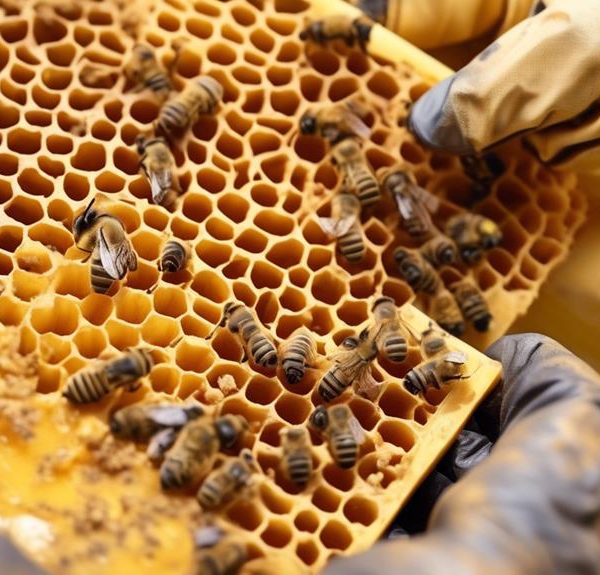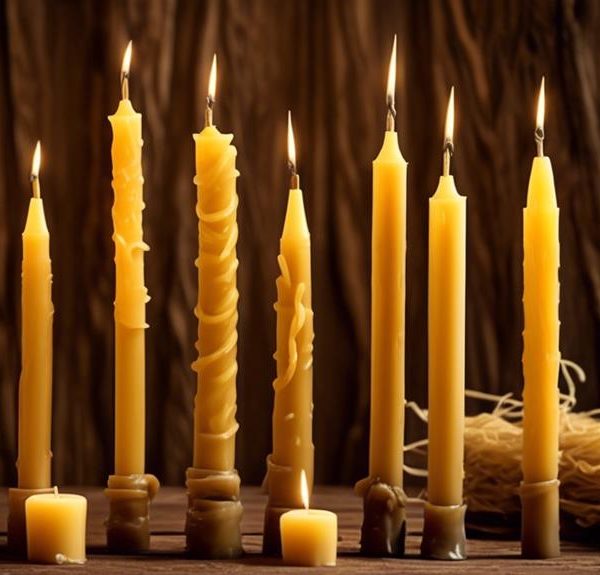Find out how you can contribute to the environment and enjoy homemade honey by keeping bees right in your Brisbane backyard.
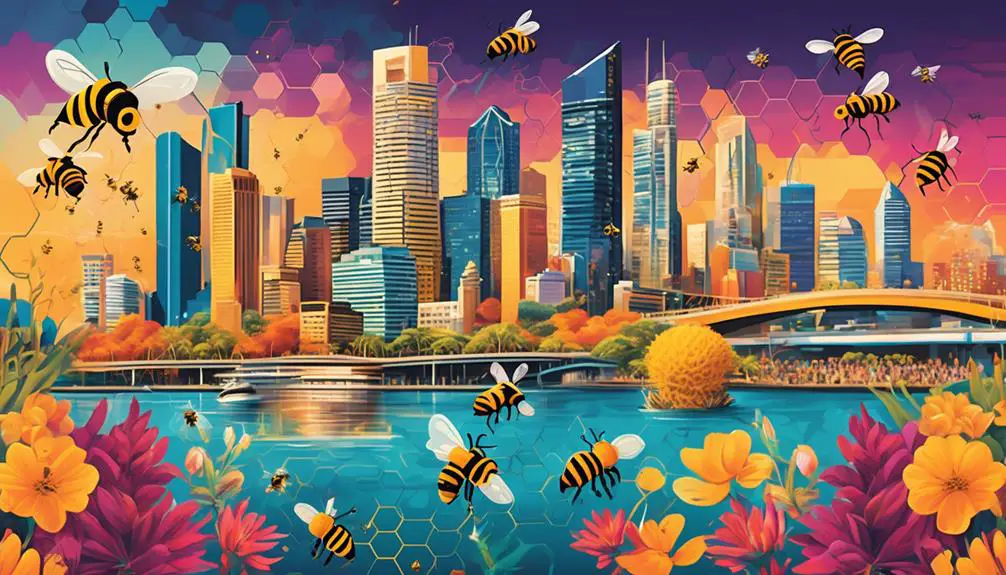
Can You Keep Bees in Brisbane?
Have you ever wondered if you can keep bees in Brisbane? Well, you're not alone. Many urban dwellers are exploring the possibility of beekeeping right in their backyards, and Brisbane is no exception.
Beekeeping is not only fascinating, but it also contributes to the environment and provides you with fresh, homemade honey.
However, you must understand the local regulations and challenges before you set up your first hive.
So, are you ready to embark on this buzzing adventure?
Key Takeaways
- Beekeeping in Brisbane is regulated by local laws to prevent nuisance and protect public health.
- Beekeepers in Brisbane must adhere to specific regulations, including registering their hives and maintaining minimum distances from public areas and neighbors' dwellings.
- Urban beekeeping in Brisbane offers various benefits, such as increased pollination, biodiversity, and community engagement.
- Beekeepers in Brisbane face challenges such as pests, unpredictable honey production, and the need for vigilance in hive protection.
Understanding Brisbane's Beekeeping Regulations
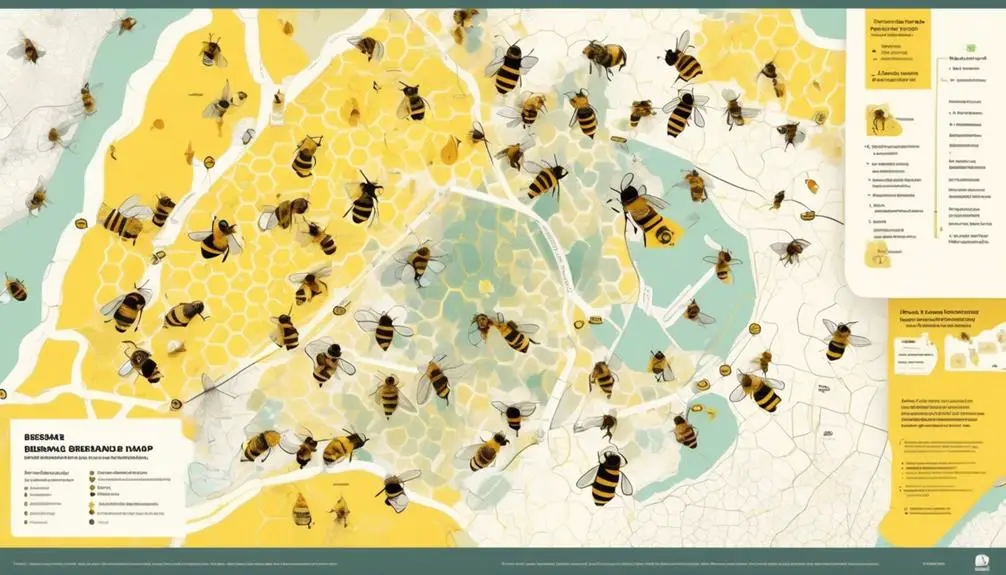
So, what exactly are Brisbane's beekeeping regulations and how can they impact your honey-making journey?
For starters, you need to know that local laws regulate beekeeping to ensure it doesn't become a nuisance or a threat to public health. You can't just set up a hive anywhere you like. Instead, you have to adhere to certain requirements.
For instance, Brisbane City Council mandates that your beehive must be at least 3 metres away from any public footpath or road and 6 metres from your neighbour's dwelling. This is to prevent bees from becoming a bother to passersby or your neighbours.
Moreover, you have to register your hive with Biosecurity Queensland and comply with the Australian Honey Bee Industry Biosecurity Code of Practice. This ensures your bees are regularly checked for diseases that can harm the local bee population.
Beekeeping isn't just a hobby; it's a responsibility. These regulations ensure that you're accountable for your bees and their impact on the environment. So, as you embark on your honey-making journey, remember that by following these rules, you're not only protecting your bees, but also contributing to a healthier and happier Brisbane.
Benefits of Urban Beekeeping
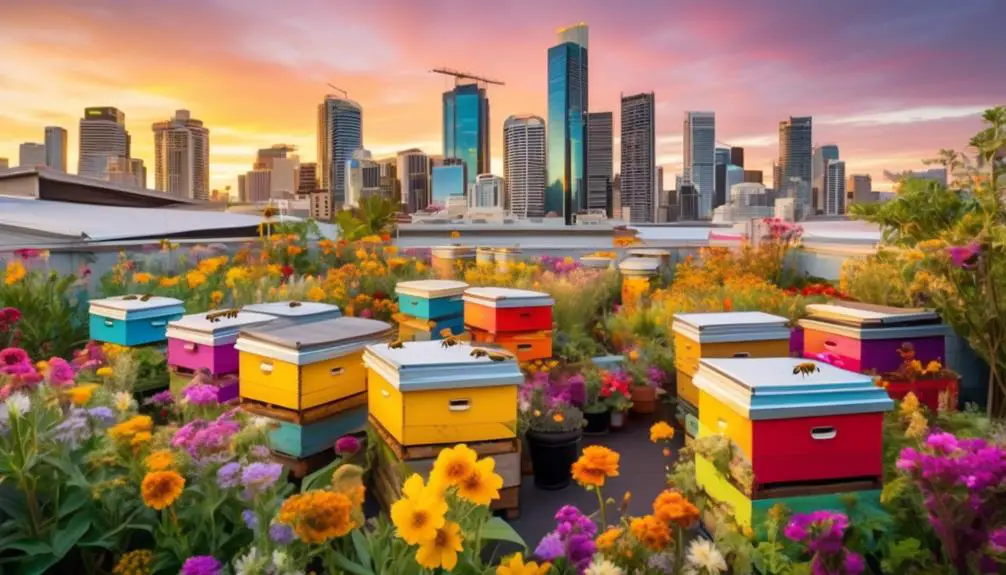
While adhering to Brisbane's beekeeping regulations is crucial, it's equally important to appreciate the myriad benefits that urban beekeeping can bestow upon our city and its residents.
Urban beekeeping isn't just a fascinating hobby; it's a way to contribute positively to our environment. Bees play an essential role in pollination, ensuring our gardens bloom and our fruit trees bear produce. Urban beekeeping increases biodiversity, making our city more resilient and vibrant.
But the benefits aren't just environmental. Urban beekeeping can also be a rewarding personal pursuit. It's a chance to develop a deeper understanding of nature's intricacies, and there's nothing quite like the sweetness of your own honey.
Urban beekeeping also fosters community spirit. Creating a hive in your backyard can stimulate conversations with neighbours, leading to shared learning experiences and possibly even collaborative urban farming projects.
In a world where sustainability is vital, urban beekeeping shines as a small but significant way to make a difference. It's a practice that enriches our city, our ecosystems, and our lives.
Challenges in Brisbane Beekeeping
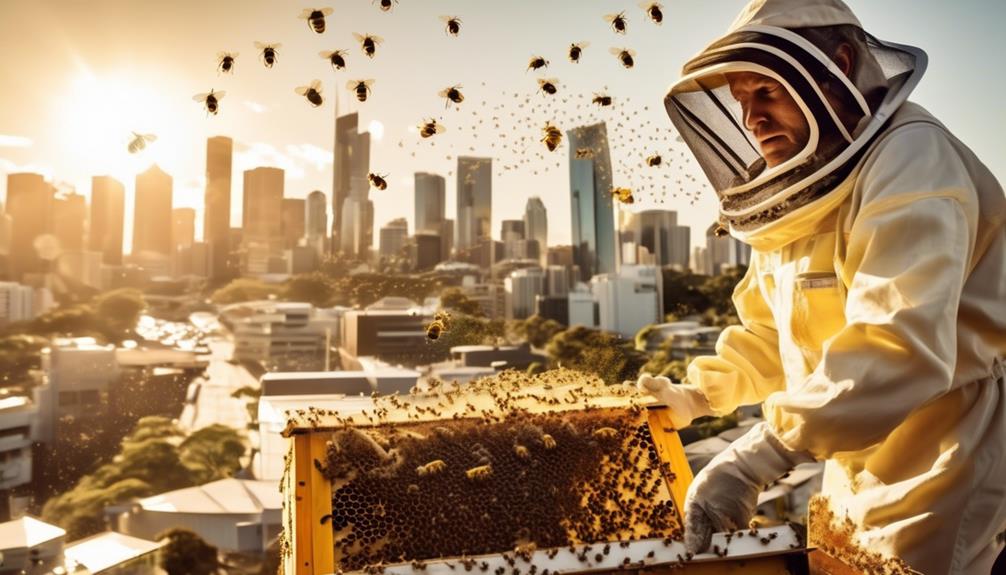
Despite the sweetness of the deal, you'll face a few stings along the way as beekeeping in Brisbane presents its own unique set of challenges.
The subtropical climate is a double-edged sword. Yes, it's conducive to year-round bee activity but it also attracts pests like small hive beetles and Varroa mites. You'll need to stay vigilant, or these uninvited guests could devastate your hives.
Local regulations can be another hurdle. You must respect the Brisbane City Council laws that dictate hive placement, and don't forget about the Queensland Biosecurity Act which requires registration of your bees. Navigating these laws can be a bit of a headache, but it's necessary for ethical beekeeping.
Furthermore, honey production can be unpredictable due to weather fluctuations and changes in floral sources. One season, you might be swimming in honey and the next, you could be left high and dry.
Don't let these challenges deter you, though. With some grit and determination, you can overcome these obstacles and reap the sweet rewards of your labour. Remember, every sting is just a learning curve on your journey to becoming a successful Brisbane beekeeper.
Essential Beekeeping Tools and Equipment
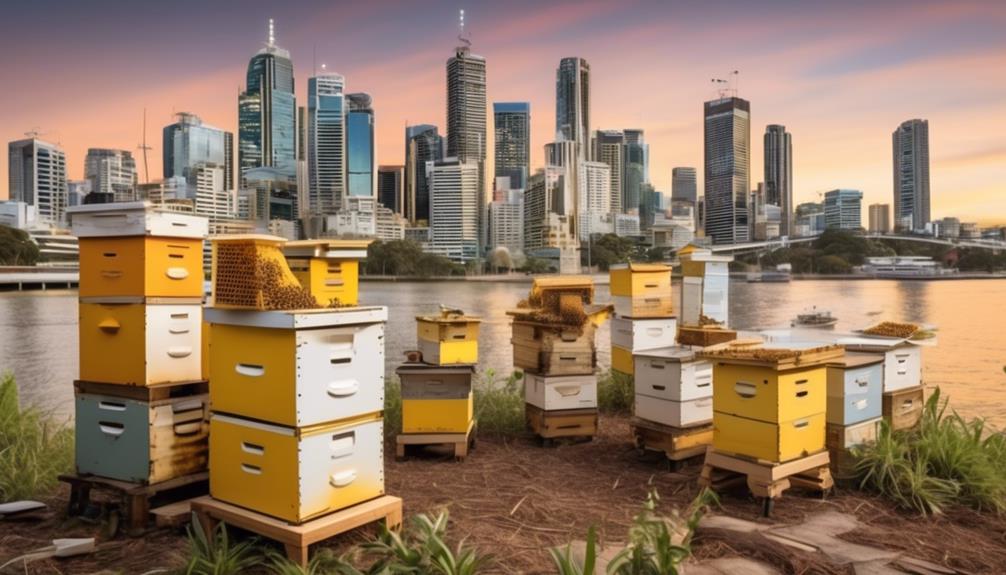
Diving into the world of beekeeping, you'll need an array of essential tools and equipment to ensure successful and smooth operation of your hives. Passionate about bees? Then you'll love getting equipped for this rewarding task. Let's go over some of the must-haves.
First off, you can't overlook a bee suit. It's your armor, protecting you from stings while working with your hive. Choose one that offers full coverage, and don't forget the gloves!
Next, a smoker is crucial. It emits smoke, calming bees and making them less aggressive. Load it with natural fuels like pine needles or wood shavings for best results.
A hive tool is your versatile friend, used for everything from prying apart hive boxes to scraping off excess wax. Always keep one handy.
Bee brushes gently remove bees from frames during inspections, while a queen catcher ensures the queen is safe during these checks.
Steps to Start Your Beekeeping Journey
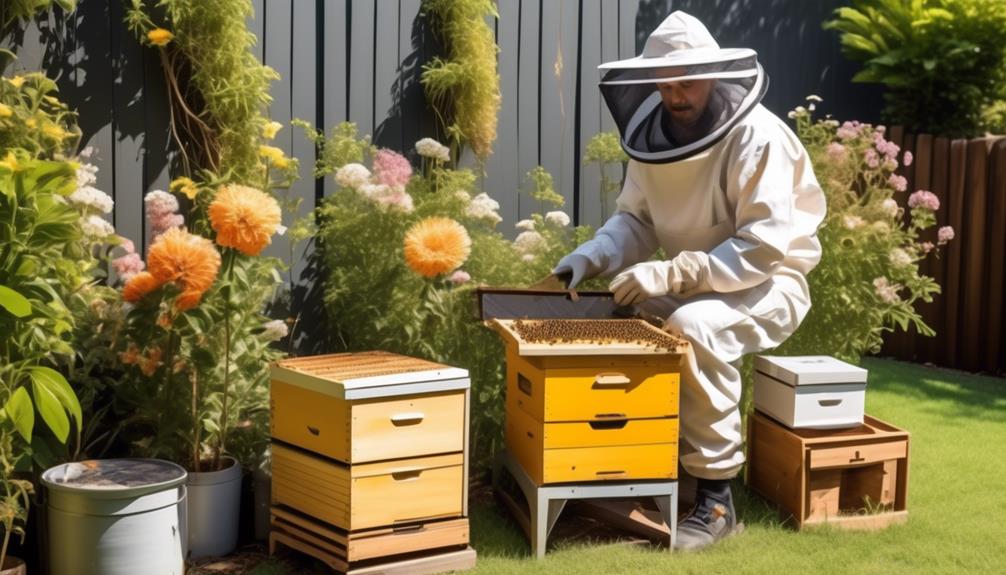
Embarking on your beekeeping journey, you'll find excitement and fulfillment, but it's essential to follow a few crucial steps to ensure a thriving hive and a rewarding experience.
The first step is to educate yourself. Dive into beekeeping books, join local beekeeping clubs, and attend workshops. Knowledge is power, and it's vital to understand bee behavior, hive management, and disease control.
Next, choose your bees wisely. Are you going for honey production, pollination, or simply as a hobby? Your goals will determine the species you'll keep. Local Brisbane species, like the stingless native bees, are a great choice for beginners.
Obtain the necessary permits and register your hives. Brisbane City Council requires all beekeepers to register, ensuring public safety and disease control. After securing the permits, select a suitable location for your hives. Consider factors like sun exposure, wind direction, and proximity to neighbors.
Lastly, purchase your equipment. An ideal starter kit includes a hive, a bee suit, a smoker, and a hive tool. Remember, beekeeping is a journey, not a race. Don't rush, take your time, and you'll soon reap the sweet rewards of your labor.
Frequently Asked Questions
What Are the Different Types of Bees That Can Be Found in Brisbane?
In Brisbane, you'll discover a diverse range of bees. You'll encounter European Honey Bees, Stingless Native Bees, and solitary bees like the Blue Banded and Teddy Bear bees. You'll also find Carpenter Bees, known for their wood-burrowing habits.
Each type plays a crucial role in our ecosystem, pollinating our plants and flowers. So, next time you're out in your garden, take a moment to appreciate these hardworking creatures.
How Does the Climate in Brisbane Affect Bee Behavior and Honey Production?
Brisbane's subtropical climate greatly influences bee behavior and honey production. You'll find that bees are most active in warm, sunny conditions, perfect for Brisbane's weather. However, they'll retreat during wet, cold periods.
The region's diverse flora allows bees to produce unique, flavorful honey year-round. But remember, extreme heat can stress bees, impacting honey yield. So, it's essential to provide shade and water for your hive during hot spells.
Can Bees Have a Negative Impact on Local Biodiversity in Brisbane?
Yes, bees can impact local biodiversity in Brisbane. They're not native and can out-compete local species for resources. However, they also pollinate plants, which benefits the ecosystem.
It's a delicate balance. You need to manage your bees responsibly, ensuring they don't become a problem. Remember, it's not just about honey production, it's about respecting and nurturing our environment.
What Are Some Common Diseases or Pests That Brisbane Beekeepers Should Be Aware Of?
You've got to watch out for pests and diseases that could harm your bees. The most common include Varroa mites, American Foulbrood, and Small Hive Beetles. These can severely impact your hive's health and productivity.
Keep an eye out for signs of these pests such as weakened or dwindling colonies, larvae death, and hive beetles within the hive. Regular inspections and proper management can help keep these threats at bay.
How Can Beekeeping Contribute to Community Education and Awareness in Brisbane?
You can greatly contribute to your community's education and awareness in Brisbane through beekeeping.
By sharing your knowledge and experience, you're helping others understand the importance of bees in our ecosystem.
You could start a local bee club, offer workshops, or even invite schools for a visit.
When you're passionate about bees, it's contagious.
Conclusion
So, you can indeed keep bees in Brisbane! Embrace the challenges, reap the benefits, and equip yourself with the necessary tools. Just make sure to follow all local regulations.
Beekeeping isn't only a fascinating hobby but also a great way to contribute to our environment. So, why not start your beekeeping journey today?
You'll be buzzing with excitement every step of the way.

